Dehydration isn’t just an issue to be aware of in the summer months or when working in an environment with higher than average temperatures. Dehydration can become serious for everyone, no matter the time of year or work environment if enough fluids are not consumed throughout the work day.
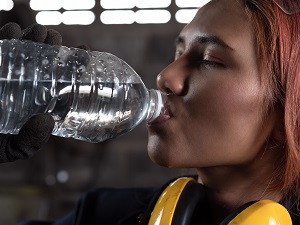
Water plays a vital role for the human body and it is important to understand the importance of hydration when it comes to keeping our bodies healthy. Proper hydration can prevent illness and keeps the body from overheating.
The Function of Hydration
Every day our bodies lose water by breathing, perspiration, urination and bowel movements. For your body to function properly, every worker needs to stay hydrated by consuming beverages and foods that contain water. Dehydration can occur when more water and fluids leave the body than have been taken in and if ignored, dehydration can become life-threatening.
When a person exercises, performs manual labor, works in a hot environment, or wears a lot of personal protective equipment (PPE), the body will naturally generate heat. To keep from burning up, the body needs to release that heat and the main way that is accomplished is through sweat. Sweating can reduce the body’s water level and this fluid loss may affect normal bodily functions if that fluid is not replenished soon enough.
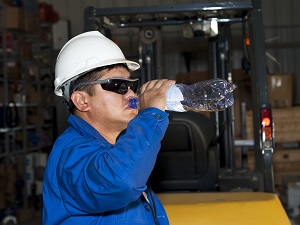
Dehydration Dangers
Dehydration can affect the human body in many negative ways and has been linked to a higher frequency of:
- Urinary tract infections
- Reduced kidney function
- Slower wound healing
- Migraines or persistent headaches
When workers become severely dehydrated, extreme symptoms that may occur include:
- Unconsciousness
- Heat stroke
- Seizures
- Kidney failure
- Shock
- Brain damage
- Death
It’s critically important that all workers stay hydrated throughout the work day.
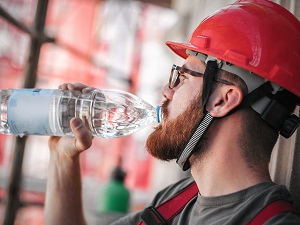
Dehydration Symptoms
Recognizing symptoms of dehydration is important to prevent serious injury or worse. Look out for these signs:
Mild Dehydration can cause thirst, dry lips, dry mouth, flushed skin, fatigue, irritability, headache, darker urine, decreased urine output, and muscle weakness.
Moderate Dehydration may cause very dry mouth, sunken eyes, limited, odd colored or very dark urine, muscle cramps, stiff or painful joints, irritability, severe headache, nausea and decreased skin turgor (skin that doesn't bounce back quickly when pressed or pinched).
Severe Dehydration can be recognized by lack of sweating, chest or abdominal pain, decreased skin turgor, blotchy skin, confusion, lethargy, cold hands and feet, rapid breathing, rapid and weak pulse, low blood pressure, dizziness, fainting, high fever, and minimal or no urination.
Start first aid procedures and contact emergency medical services if a worker shows any signs of moderate to severe dehydration.

Staying Hydrated
During the work day, dehydration can cause a lack of energy, irritability, headache, constipation, or dizziness, all of which can impact a worker’s productivity and safety.
Drinking water is the best way to stay hydrated. Water helps your body:
- Maximize physical and mental performance
- Regulate body temperature
- Flush body waste
- Lubricate and cushion joints
OSHA Construction Standard 1926.51(a)(1) An adequate supply of potable water shall be provided in all places of employment.
OSHA General Industry Standard 1910.141(b)(1)(i) Potable water shall be provided in all places of employment.
The term potable water refers to water that is safe to drink or use for food preparation. Workers should only be drinking potable water, or other beverages that are clean and safe to drink.
Never drink from a shared cup. Use a personal cup or water bottle or drink from disposable cups.
Do not rely on the feeling of thirst to prompt you to drink water. Hydrate with fluids throughout the work day to prevent dehydration.
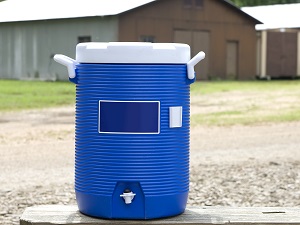
When considering water intake used to hydrate the body, this includes drinking water, hydrating beverages and the water contained in food. About 20% of a person’s hydration comes from the food they eat and the remaining 80% comes from water or other beverages.
Drinking water is a great way to stay hydrated, but for moderate to strenuous work or when working in the heat, it may be beneficial to consume beverages with electrolytes.
Although popular sports drinks can replenish electrolytes, beware of the high sugar content that may add unwanted calories or artificial sweeteners that may cause uncomfortable digestive symptoms in some people. Healthier alternatives that can provide electrolytes along with hydration include coconut water or electrolyte tablets that can be added to water.
NIOSH recommends that for moderate activity in moderate conditions, each worker should drink 1 cup of water every 15 to 20 minutes.
OSHA encourages workers to drink at least 1 cup of water every 20 minutes while working in the heat.
The National Academies of Sciences, Engineering, and Medicine determined that an adequate daily fluid intake is about 15.5 cups of fluids for men and about 11.5 cups of fluids a day for women with a reminder that 20% of that daily fluid intake comes from foods.
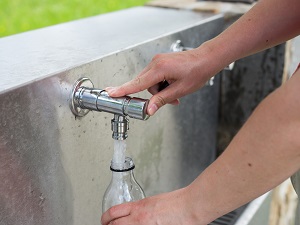
.jpg)

.jpeg)